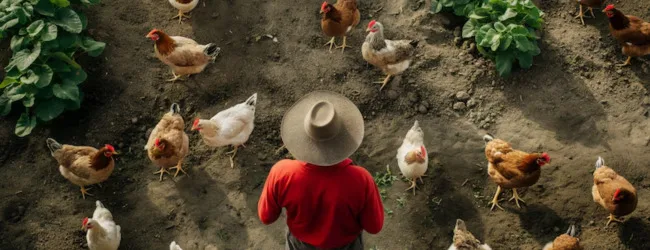Table of contents
Organic farming in 2025 is more than just growing food without chemicals—it’s a philosophy rooted in care for the environment, animals, and people. At its heart lie four powerful principles that guide farmers globally to grow sustainable, healthy food. In this article, we explore the principles of organic farming, how they work, why they matter, and how they’re shaping the future of agriculture.
What Are the Principles of Organic Farming?

According to the International Federation of Organic Agriculture Movements (IFOAM), organic farming is based on four core principles:
✅ 1. Principle of Health
Organic farming should sustain and enhance the health of:
- Soil
- Plants
- Animals
- Humans
💡 Noteworthy: Healthy soil = Healthy crops = Healthy people
Key Practices:
- Avoid synthetic chemicals
- Use compost and green manure
- Promote biodiversity to fight pests naturally
- Enhance soil life using crop rotation and cover crops
✅ 2. Principle of Ecology
Farming should be in harmony with natural ecosystems. This includes:
- Working with natural cycles (water, nutrients, biodiversity)
- Respecting regional environmental conditions
Real-World Practices:
- Use native seeds and species
- Maintain natural habitats around farms
- Promote pollinator-friendly practices
- Use organic mulching instead of plastic
📊 Example Table: Ecological vs. Chemical-Based Farming
| Aspect | Organic Farming (Ecology) | Chemical-Based Farming |
|---|---|---|
| Pest Control | Natural predators | Synthetic pesticides |
| Soil Fertility | Compost & manure | Chemical fertilizers |
| Biodiversity Support | High | Low |
✅ 3. Principle of Fairness
Organic farming should build relationships that ensure:
- Fairness to farmers, workers, processors, and consumers
- Respect for animal welfare
- Social justice in agriculture
How This Works in Practice:
- Fair trade certification
- Transparent supply chains
- Proper working conditions for labourers
- Humane treatment of animals
📌 Highlight: In India, organic cotton farmers under fair-trade cooperatives reported 25% higher earnings in 2024.
✅ 4. Principle of Care
This principle encourages precaution and responsibility in farm decisions.
Why it matters:
- Organic farming avoids risky technologies like GMOs
- Long-term impact on soil and biodiversity is considered
- Focus on sustainability over short-term gains
Farmer Strategies in 2025:
- Use of AI to monitor crop health without harming ecosystems
- Water-saving irrigation, like drip irrigation systems
- Crop insurance to manage climate uncertainty
💡 Pro Tip: If you want to start a Business but have too many doubts, connect with a Business expert from Boss Wallah for guidance – Check Out
Benefits of Following These Principles
| Benefit | Result |
|---|---|
| Healthier food | No chemical residues |
| Soil fertility | Long-lasting, self-sustaining soil health |
| Environmental protection | Reduced carbon footprint, better ecosystems |
| Higher consumer trust | Growing organic market demand |
🌾 Stat: The global organic food market is expected to reach $620 billion by 2025 (Statista, 2024).
ALSO READ | Integrated Organic Farming in 2025: Blueprint for Sustainable & Profitable Agriculture
Key Components of Organic Farming in Practice
Even while following principles, organic farming in 2025 involves real strategies:
🌿 Common Organic Practices:
- Crop rotation: Maintains soil fertility
- Composting: Enhances soil microbes
- Biological pest control: No pesticides
- Agroforestry: Boosts biodiversity
- Intercropping: Improves land productivity
📊 Chart: Organic Farming vs Conventional Farming
| Parameter | Organic Farming | Conventional Farming |
|---|---|---|
| Fertilizers | Natural (compost, manure) | Chemical (urea, DAP) |
| Pesticides | Neem oil, bio-pesticides | Synthetic pesticides |
| Cost (Initial) | Higher | Lower |
| Profit Margin | Higher (long-term) | Moderate |
| Soil Quality | Improves over time | Degrades gradually |
ALSO READ | Who is the Father of Organic Farming? Discovering Sir Albert Howard’s Legacy in 2025
Role of These Principles in India (2025)

India is embracing organic farming like never before:
- Sikkim is 100% organic
- Rajasthan, Uttarakhand, and Maharashtra are promoting organic clusters
- Government support through Paramparagat Krishi Vikas Yojana (PKVY)
🧑🌾 In 2025, over 3.6 million hectares are organically farmed in India!
Need Expert Guidance?
Starting a business can be challenging, but you don’t have to do it alone! At Boss Wallah, our 2,000+ business experts are ready to provide valuable insights and guidance. Whether you need help with marketing, finance, sourcing, or any other area of any business, our business experts are here to help you succeed
Confused about Which Business to Start?
Want to start your own business but unsure which one to choose? Explore Boss Wallah, where you’ll find 500+ courses by successful business owners, featuring practical, step-by-step guides on starting and growing various businesses.
Find your perfect business idea today
Conclusion
The principles of organic farming—Health, Ecology, Fairness, and Care—are not just rules; they are the foundation of a better, more sustainable future. As we move through 2025, adopting these principles means ensuring healthy soil, safe food, and a balanced environment. Whether you’re a farmer, consumer, or policymaker, these guiding values can help build a greener tomorrow.
Frequently Asked Questions (FAQs)
The four principles are Health, Ecology, Fairness, and Care.
The principles were defined by the IFOAM – International Federation of Organic Agriculture Movements.
Healthy soil supports better crop yield, water retention, and natural pest control.
Yes, with improved techniques like integrated organic systems and AI-powered monitoring.
Biodiversity naturally manages pests, improves soil fertility, and increases farm resilience.
Organic farming avoids synthetic chemicals and focuses on sustainability and soil health.
Yes, it contains fewer pesticide residues and is grown using natural methods.
Crop rotation, composting, natural pest control, and agroforestry.
Yes, it helps store carbon in soil and reduces greenhouse gas emissions.
In the long term, yes. Organic farmers often get better market prices and reduced input costs.


